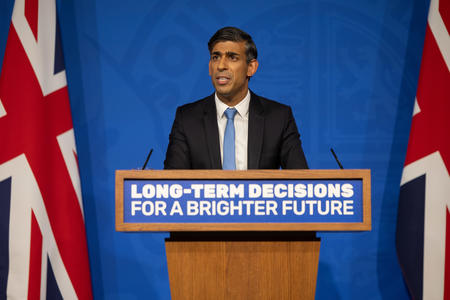Despite the recent watering down of net zero policies, the UK Government has the opportunity to restore some of the country’s climate leadership ahead of COP28 through its upcoming autumn budget. It’s not just paramount for the climate, but climate action will also help boost households and businesses, as well as grow the wider economy.
Lessons can be learned from what has been done across the Atlantic. The Inflation Reduction Act became law over a year ago in the US, with the EU responding in kind with its own plan to draw clean energy investment. Meanwhile, China continues to increase the pace and scale of its roll out of renewables. Yet despite ample opportunity, the UK continues to limp on without a clear plan.
Jeremy Hunt, the UK Chancellor of the Exchequer, promised the upcoming budget on 22nd November 2023 would be the UK’s response to the Inflation Reduction Act. At the same time, ministers have also tried to manage expectations that “the money just isn’t there” to replicate this kind of public investment.
However, the forthcoming COP28 summit in Dubai this December provides an opportunity to correct course. The UK is rightly proud to have been a leading driver of climate action, but should not rest on its laurels. A lack of leadership threatens the UK’s competitiveness as a destination for investment in green technologies.

Here are some of the fiscal measures the UK Government should adopt to support net zero and help businesses and households save money and invest.
Insulating buildings and expanding heat pumps to slash bills
The UK has some of the least efficient homes in Europe and a woeful track record on incentivising the switch to heat pumps. Mounting concerns about energy security due to the war in Ukraine have highlighted the enormous potential of energy efficiency to reduce energy waste, cut bills and slash global fossil fuel demand.
We need a revolution in building renovations, including more support for the heat pump roll-out and investment in home insulation. The UK Government currently plans to end the installation of fossil fuel heating systems in new-build properties in 2025. If it’s serious about accelerating heat pump uptake, this date should be brought forward – growing the UK heat pump value chain and ultimately bringing down costs. The UK Government must also be ambitious on minimum energy performance standards in privately rented homes, pulling our leaky housing stock up the EPC charts before 2030.
The UK needs buildings that are fit for the future. They should be warm, productive spaces with low running costs. Energy efficient buildings are needed with connected climate-smart technology built in. That means rooftop solar providing for the electricity needs when it’s sunny, a heat pump warming the building, and EVs plugged into charging points providing battery storage.
Steel bailouts must have green strings attached
Decarbonising steelmaking is crucial for national security, protecting jobs and manufacturing the steel needed to build wind turbines and electric vehicles.
The UK Government committed a package of £500 million to support Tata Steel in decarbonising Port Talbot steelmaking plant. Meanwhile, British Steel’s Scunthorpe plant, the UK’s other major steelmaking facility, will still require funds to do the same.
For any future steel bailouts, the Chancellor Jeremy Hunt should look across the channel at how the EU is future-proofing state aid for the steel sector by requiring steelmakers to move away from coal and invest in hydrogen-based steel production as a prerequisite for financial support.
Boosting homegrown and cheap renewables
The decision to lift the de facto ban on onshore wind is very welcome, but when UK Government gives with one hand, it takes away with the other.
According to reports in The Guardian, ministers are considering restricting solar panel installations on farmland to protect food security. This overlooks evidence that using land for solar farms represents no significant risk to food security with substantial benefits for energy security.
The UK Government should focus on measures to boost investment in renewables while ending subsidies for fossil fuels.

Tax relief for electric vehicles drivers
Despite the delayed phase out date for new petrol and diesel vehicles, the UK Government has delivered on its plans for a Zero Emission Vehicle (ZEV) mandate. This will go some way in supporting faster uptake of electric vehicles, but there are still barriers holding back consumers and businesses from going electric.
Rishi Sunak has said he is on the side of drivers. But if this was true, he’d be doing everything in his power to make it easier for consumers switch to electric vehicles by slashing taxes on ZEVs.
The budget should introduce a package of tax measures to accelerate the switch to electric vehicles, including the following:
- Reduce VAT on public charging from 20% to 5% to match home charging.
- Extend the plug-in van grant beyond 2024/25 and allow an increase in the number of grants that end-users can access in 2023/24.
- Reverse plans to introduce Vehicle Excise Duty on ZEVs.
- Continue favourable company car taxation rates, including keeping ‘Benefit in Kind’ rates low for ZEVs up to 2030/31.
It’s not too late for the UK to showcase that it still has some of its climate credentials, to boost the green economy and build its energy security – but time is running out. COP28 is a good opportunity, but only if actions speak louder than words.







